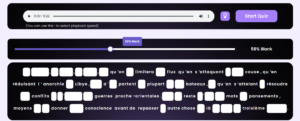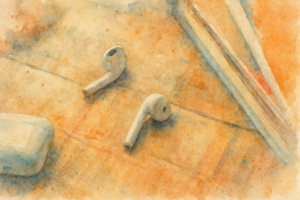Inside my real-world French listening routine: a repeatable, 15-minute practice that builds confidence, comprehension, and better ears for native French.
Yesterday, I sent an email to you about one of the best takeaways from a recent blog post: How I make the most of the site and build it at the same time.
One of my favorite takeaways from that post is having a calendar event to remember to practice. (There are even more top tips in that post.) I love this calendar event idea because it really is so simple. Create the event on your calendar at a time that works, set it to repeat daily, and just let yourself be pulled into learning for a short block daily.
Today I want to share what my 15 minute block looks like.
🕒 My 15-Minute French Listening Practice
Open the Daily Quiz
My calendar event pinged me – time to practice French listening
It’s early on a Monday morning. My wife and kids are still asleep. It’s still and it’s just me and some French. I prefer to set my calendar event in the early morning. I have my headphones and I’ve had my cup of coffee. It’s time to get into it.
I go to the daily quiz.
Be flexible. Set a schedule that works for you.
When I’ve missed my morning practice slot, which happens (only human!). I try to remember later in the day. When I have a brief pause that I can focus, I sign back in. I’ve done the quiz on the tram, when I have a brief moment between tasks, or waiting for the bus.
While the site is set up for practicing anywhere that you have an internet connection, it still does require some focus.
The exercises on this site are not meant for the commute. Avoid trying them while driving or walking. You’ll want to stop and focus. The goal is active listening. Really listening for what’s said and trying to spell it out in each textbox.
A quick scan
Immediately, I see today’s quiz is from the Manger podcast, late in episode 1. And I also see “42 words in 10 seconds.” So I know this one is a doozie.
This doesn’t stop me. And it shouldn’t stop you, no matter your level.
For each clip on site I display the total words in the clip and the length of the clip. This helps me calculate the words per minute for the clip and some other tags that I hope offer easier browsing.
However, I also appreciate that words per minute speeds might not be the most recognizable metric. (It’s the ship that made the Kessel Run in less than twelve parsecs. I’m with Luke, what is a parsec anyway…).
A normal pace for speaking also varies culturally and personally. For Americans, I believe a fast pace is anything over 180 words per minute (30 words in 10 seconds). In French, everyday speech could typically be 180-250 words per minute. Read more about pacing here.
Whether or not the WPM makes sense to you, it doesn’t really matter. You can see that 250+ on this clip is extremely fast. The speaker is going to fly through the speech. I’ve added ranges to the tags so you can see immediately if a clip is moderate, very fast, extremely fast, or ludicrously fast (yes, even those clips exist on site).
Another important thing to remember is to not get overwhelmed with the pace. Even if you’re an introductory learner, the quiz is setup so that we can hunt for a single word in the clip and listen for what the speaker says.
Start with a beginner level
For my 15 minutes, I plan on taking the quiz several times.
Here’s how it went for me this morning:

I started with 24% blank. Given the length and pace, I knew I wanted to start in the low 20% range. This would just blank out a few A1 or A2 words and give me a moment to get familiar.
Even at this level, the beginning part of the quiz was what sounded like a wall of sound. Rapid fire French with its liaisons made this clip quite challenging, even without too much difficult vocab. This has been my experience in many languages and especially with French — sometimes I can only understand my teacher.
By starting with 24% on repeat I get familiar with the pace and can hunt for smaller words at the end of the clip.
Repeat and Level Up
I definitely heard the clip more than a few times for that first level. That’s the point. In the wild we don’t get nearly as many chances for someone to repeat themselves. On this site we do.
My goal is that what was originally just sound will start to materialize as actual words. The fill in the blanks style means you’ll read anchors and start to hear them in the clip. This anchoring will help you build your confidence and hear the words in the wild.
I next level up
For today’s clip I went to 38%, then 56% and finally end at 90% before finishing. Each clip can be different, the rough idea is the same. I add in a little bit each time.
I do find that my memory kicks in as I go up the levels. I remember roughly where some words go and can partially fill in the sentence from memory.
I believe this is okay from a learning perspective. We want to internalize phrases like “j’en avais pas envie” or “même quand” or other common words. So, I’m ok with memorizing the words, as long as I keep my ears open. I can hear them and then words I know and recognize “prendre”, “manger”, & “petit-déj” as anchors, then listen for what I hear around it, and fill in all the blanks.
The final quiz at 100%
I always end my practice with the quiz fully blank, at the 100% level. This was impenetrable for me at the outset. And, after a few minutes with the quiz at various levels, I can complete the 100% blank in about the same time it took for the earlier levels.
While you may find that you remember sentences and can write them from memory. Try to listen to what you hear as you type. This helps your brain process what’s said and internalize what you hear. It’s microlistening actually helping you learn.
This was the main goal when I started the project. I wanted the “wall of sound” – what I just couldn’t understand in French – to become intelligible. It all comes down to recognizing individual words in actual use. We can memorize vocab, but that doesn’t mean we’ll understand them in real life French.
Let the confidence radiate
After completing the work I feel refreshed with energy for the language and confidence in my own abilities. Especially typing in the entire 100% quiz. I used one hint as I gave up on trying to spell a word. Even still, the confidence I feel is real.
There is a lot of value here. Here are some skills I picked up:
- Spelling
I’m a very auditory learner, so I don’t worry so much about the specifics. This exercise forces me to improve my spelling and use of accents! - Expressions
I’m picking up fixed expressions and the use of prepositions like “À” used a great deal in this clip. - Listening
Of course I’m picking up new words and vocab and at the 100% level I can understand everything in the clip.
The clip has gone from a wall of sound to an actual clip I can understand.
🕒 TL;DR: My 15-Minute French Listening Routine
- ✅ Open the daily quiz
- ✅ Start low: ~20–30% blank
- ✅ Repeat clip to get familiar with speed
- ✅ Gradually level up to 90%
- ✅ End at 100% blank for full challenge
- ✅ Reflect: What did I learn, hear, or finally understand?
How do you practice your listening skills daily?
Share below your top tips for working with this site or other daily activities that help you improve!








